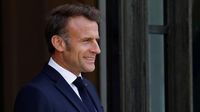On May 9, 2025, in Nancy, Polish Prime Minister Donald Tusk was welcomed by French President Emmanuel Macron to sign a historic treaty aimed at enhancing cooperation between the two nations. The signing took place on Europe Day, a date symbolically significant for both countries.
The treaty, scheduled for signing around 14:40, seeks to elevate Franco-Polish relations to a higher level of ambition, particularly focusing on military defense and energy strategy. This agreement marks a significant step in strengthening ties, especially in light of the ongoing geopolitical tensions in Eastern Europe.
Prior to the signing, Macron and Tusk enjoyed a working lunch at the prefecture in Nancy, with a press conference set to follow at approximately 15:30. The choice of Nancy as the venue is steeped in historical significance, as it is home to the Place Stanislas, named after Stanislas Leszczynski, the deposed King of Poland who found refuge there in the 18th century.
Traffic restrictions were implemented throughout the city from 8:00 to 18:00 to ensure security during this high-profile event, affecting several key locations including Rue Sainte-Catherine and Place Stanislas. The event attracted attention not only for its diplomatic significance but also for its cultural resonance, as Nancy has a long-standing connection with Poland.
In recent years, France has pursued similar treaties with other European nations, including Germany in 2019, Italy in 2021, and Spain in 2023. However, this treaty with Poland is particularly notable as it is the first such agreement with a country that does not share a border with France.
As the leaders prepared to sign, discussions surrounding the treaty highlighted its comprehensive nature, which encompasses not only defense and energy but also scientific, educational, linguistic, and cultural exchanges. The need for such cooperation has been underscored by the ongoing war in Ukraine, which has elevated Poland's role within NATO and reinforced its strategic importance in Europe.
"The objective of this treaty is to solidify Franco-Polish friendship and to enhance our bilateral partnership in security, defense, infrastructure, and energy," stated a representative from the French presidency. This sentiment reflects a broader acknowledgment of Poland's growing influence in European affairs, particularly as it navigates its relationship with Russia.
Poland's defense spending currently stands at around 5% of its GDP, a figure indicative of its commitment to military modernization in response to regional threats. This treaty is expected to facilitate deeper military cooperation between France and Poland, addressing shared security concerns and fostering a more integrated defense strategy.
The historical context of the treaty signing adds layers of significance. Stanislas Leszczynski's legacy as both a Polish king and a figure of French history symbolizes the enduring ties between the two nations. The city of Nancy, where he once resided, serves as a poignant backdrop for this momentous occasion.
In contrast to the celebrations in Nancy, Russian President Vladimir Putin hosted a military parade in Moscow on the same day, marking the 80th anniversary of the victory over Nazi Germany. This juxtaposition of events highlights the contrasting political landscapes in Europe and the importance of alliances in the face of potential threats.
The signing of this treaty represents not only a diplomatic milestone but also a strategic pivot for both nations. It underscores France's intention to strengthen its military and diplomatic ties in Eastern Europe, while also providing Poland with an opportunity to assert its independence from American military dependence.
As anticipation builds around the specifics of the treaty, questions remain about its implications for European security architecture. The prospect of a French nuclear umbrella for Poland has been a topic of interest, potentially shifting the dynamics of defense in the region.
Overall, this treaty is a testament to the evolving landscape of European diplomacy and defense, with France and Poland positioning themselves as key players in a rapidly changing geopolitical environment. The event in Nancy is not just a signing ceremony; it is a declaration of intent to forge a stronger, more resilient partnership in the face of contemporary challenges.
As the day unfolded, the atmosphere in Nancy was charged with excitement and expectation, reflecting the historical significance of the moment. The partnership between France and Poland is set to enter a new chapter, one that promises to enhance cooperation and solidarity in the face of shared challenges.






